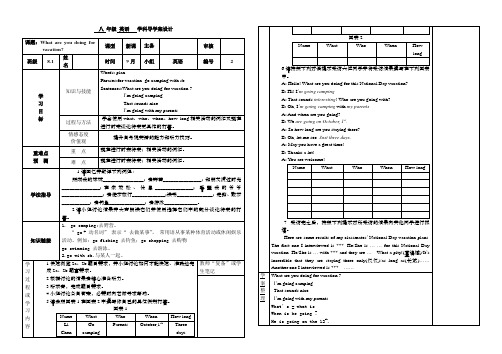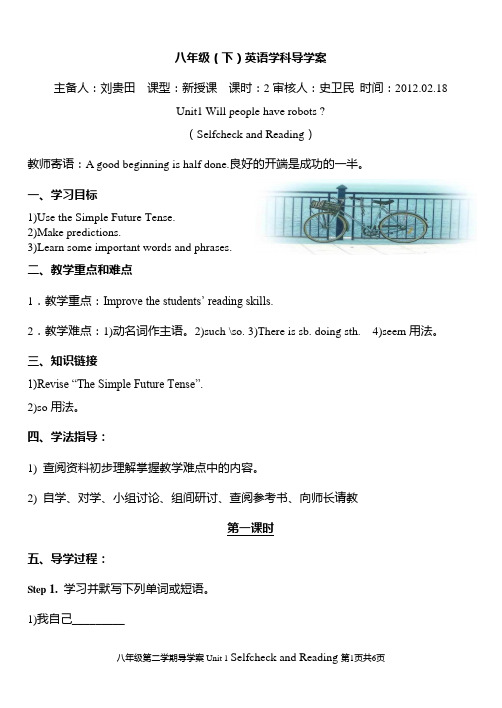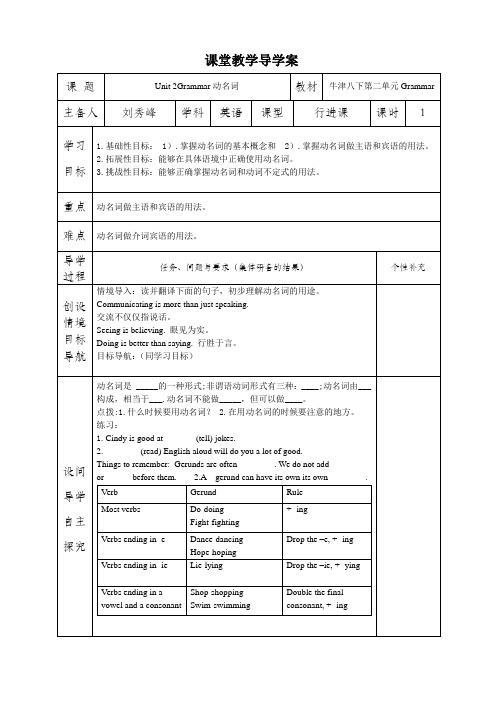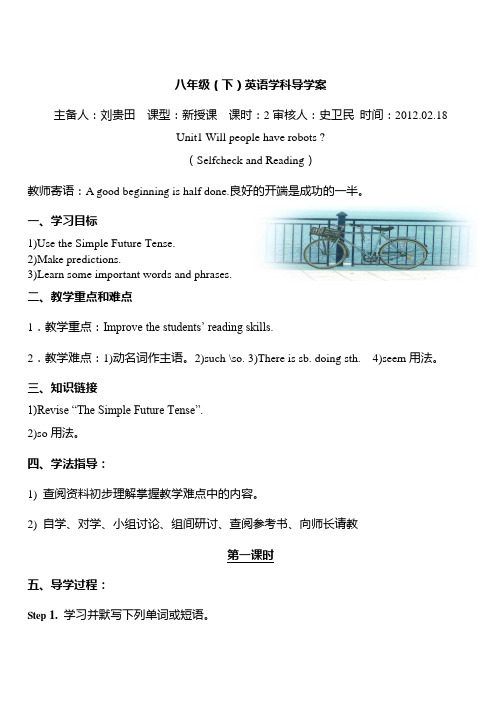八年级第二学期英语学科导学案49
unit3.What are you doing for vacation第2课时附教学反思

B: Oh, let me see.Just three days.
A: May you have a great time!
B: Thanks a lot!
A: You are welcome!
Name
What
Who
When
4. We're going campingnext Friday. (就划线部分提问)
______ ______you going camping?
5. I visited my friends inBeijingtwice a monthlast year.(就划线部分提问)
______ ______did you visited your friends inBeijinglast year?
We're______ ______have a sports camp next Sunday.
3. We're going to the Great Wall withour teacher. (就划线部分提问)
______ are you going to the Great Wall______?
教师“复备”或学生笔记
学案整理
What are you doing for vacation ?
I’m going camping.
That sounds nice.
I’m going with my parents.
What’s = what is
When is he going ?
He is going on the 12th.
学
八年级(下)英语学科导学案Unit1c

八年级(下)英语学科导学案主备人:刘贵田课型:新授课课时:2审核人:史卫民时间:2012.02.18Unit1 Will people have robots ?(Selfcheck and Reading)教师寄语:A good beginning is half done.良好的开端是成功的一半。
一、学习目标1)Use the Simple Future Tense.2)Make predictions.3)Learn some important words and phrases.二、教学重点和难点1.教学重点:Improve the students’ reading skills.2.教学难点:1)动名词作主语。
2)such \so. 3)There is sb. doing sth. 4)seem用法。
三、知识链接1)Revise “The Simple Future Tense”.2)so用法。
四、学法指导:1) 查阅资料初步理解掌握教学难点中的内容。
2) 自学、对学、小组讨论、组间研讨、查阅参考书、向师长请教第一课时五、导学过程:Step 1. 学习并默写下列单词或短语。
1)我自己_________2)面谈__________3)预言v._________4)实现__________5)公司__________6)小说__________7)使人不愉快的__8)科学家________9)在将来________10)可是_________ 11)make过去式___12)好几百_______13)早已_________14)工厂_________15)简单的_______16)这样的_______17)厌烦的_______18)各地_________19)人类_________20)外形_________21)蛇___________22)地震_________23)可能的_______24)电的_________25)牙刷_________26)似乎_________27)不可能的_____28)家务_________29)级别_________30)巨大的_______31)come过去式___32)预言n.________33)声音_________34)think过去式___35)策略_________Step 2. Page7,组长带领组员完成第一部分,通读课本第二部分,理解其含义, 找出并默写下列重要短语、句子。
八年级(下)英语学科导学案Unit1B

年级(下)英语学科导学案主备人:课型:新授课审核人:时间:Unit1 Will people have robots ?Section B教师寄语:Don't put off till tomorrow what should be done today.今日事,今日毕。
一、学习目标1)Learn the Simple Future Tense.2)Make predictions.3)Learn the new words of Unit 1.二、教学重点和难点1.教学重点:The Simple Future Tense.2.教学难点:1)alone\lonely2)be able to \can.三、知识链接1)Revise “The Simple Future Tense”.2) can用法。
四、学法指导:1) Reading the words of Unit 1 by themselves.2) Understanding the meaning of the sentenses from pages 5 to 6.五、导学过程:1.通读课本from pages 5 to 6,理解其含义.2.找出课本(from pages 5 to 6)的重要短语.3. alone\lonelyalone 表示_____________________________________________;alone=______________________.We are alone.= We are ___ ____.lonely表示①_______________________②___________________. Th e old man lives in a ______ village ______,but he doesn’tfeel___________.( alone\lonely)4.be able to 、can用法:be able to表能力,为情态动词,接动词原形,有_____ _____变化可用于各种时态,可用于动词不定式后。
八下英语 Unit 2Grammar最佳导学案

动名词做主语和宾语的用法。
难点
动名词做介词宾语的用法。
导学过程
任务、问题与要求(集体研备的结果)
个性补充
创设情境目标导航
情境导入:读并翻译下面的句子,初步理解动名词的用途。
Communicating is more than just speaking.
交流不仅仅指说话。
Seeing is believing.眼见为实。
My sister ________ _______ English songs every day.
知识建构
1.什么叫动名词?
2.动名词的构成规则
3.动名词在句子中充当什么成分?
4. 什么时候要用动名词?
总结
反思
Doing is better than saying.行胜于言。
目标导航:(同学习目标)
设问导学自主探究
动名词是_____的一种形式;非谓语动词形式有三种:____;动名词由___构成,相当于___.动名词不能做_____,但可以做____。
旅游是值得的。
教师点拨:
动名词作主语时,有时也可以用it作先行主语,且常与any/no good,any/no use和(not) worth连用。
当堂训练拓展延伸
当堂训练:
完成导学案23页Exercise1的练习
点拨:有些动词,如forget, go on, remember,
stop, try等,后面既可以接动名词,
3. 那个小男孩害怕晚上独自睡觉。
The little boy is _____ _____ ________ alone at night.
4. 在公园野餐真有趣。
___________ a picnic in the park _____ really interesting.
八年级(下)英语学科导学案Unit1c

八年级(下)英语学科导学案主备人:刘贵田课型:新授课课时:2审核人:史卫民时间:2012.02.18Unit1 Will people have robots ?(Selfcheck and Reading)教师寄语:A good beginning is half done.良好的开端是成功的一半。
一、学习目标1)Use the Simple Future Tense.2)Make predictions.3)Learn some important words and phrases.二、教学重点和难点1.教学重点:Improve the students’ reading skills.2.教学难点:1)动名词作主语。
2)such \so. 3)There is sb. doing sth. 4)seem用法。
三、知识链接1)Revise “The Simple Future Tense”.2)so用法。
四、学法指导:1) 查阅资料初步理解掌握教学难点中的内容。
2) 自学、对学、小组讨论、组间研讨、查阅参考书、向师长请教第一课时五、导学过程:Step 1. 学习并默写下列单词或短语。
1)我自己_________2)面谈__________3)预言v._________4)实现__________5)公司__________6)小说__________7)使人不愉快的__8)科学家________9)在将来________10)可是_________ 11)make过去式___12)好几百_______13)早已_________14)工厂_________15)简单的_______16)这样的_______17)厌烦的_______18)各地_________19)人类_________20)外形_________21)蛇___________22)地震_________23)可能的_______24)电的_________25)牙刷_________26)似乎_________27)不可能的_____28)家务_________29)级别_________30)巨大的_______31)come过去式___32)预言n.________33)声音_________34)think过去式___35)策略_________Step 2. Page7,组长带领组员完成第一部分,通读课本第二部分,理解其含义, 找出并默写下列重要短语、句子。
八级(下)英语学科导学案UnitB

八年级(下)英语学科导学案Unit 4He said I was hard-working.(Section B)教师寄语:Wherethere is a will,there is a way. 有志者事竟成。
一、学习目标1)Report what someone said.2) Learn some important words and phrases.二、教案重点和难点1.教案重点:Report what someone said.2.教案难点:Report what someone said.三、知识链接宾语从句.四、学法指导:1) 查阅资料初步理解掌握教案难点中的内容。
2) Prepare the students’ book from page 29to 31.五、导学过程:1. 复习直接引语和间接引语2. 组长带领组员通读课本from page 29to 31,理解其含义并补全文章。
3.组长带领组员熟读课文,并指定课堂朗读人选。
4. 组长带领组员找出课本(from page 29to 31)的重要短语、句子。
并指定课堂展示人选。
nguage points:1)be good at =do well inI’m dood at speaking.=I do well in speaking.be good for Vegetables are good for us.be good to sb. My classmates are all good to me.2) have a hard time doing\with sth.They had a hard time passing their math course.I had a really hard time with science this semester.3) be disappointed at/about …be disappointed to do sth.4) send one’s love to sb.5) get over6) get mad at sb.7) do one’s own work六、学习小结我的收获:_________________________________________________七、达标检测:一、词汇测试A.用所给单词的适当形式填空1.Tom does well in Chinese,however,Lucy does Chinese_______(well)than Tom.2.Lily isn`t good at maths,in the end-of-year exams she did__________(bad) of all the students.3.When I heard the_________news,how_________ I am!(disappoint)4.We are________(luck) enough to have bought the last tickets for the World Cup.B.根据汉语或首字母提示完成单词1.It`s k_______ to all that Bill Gates is a famous person all over the world.2.Miss Zhao said that Jack wasn’t lazy,he was a h__________ student.3.“L________,I have passed the Mid-exam.”Ford told us happily.4.All of the ____________(信息) come from the west.5.She isn’t a hard-working girl,every day she always______(照抄)my homework.二. 请选出正确的答案:1. Where was Alice’s sister? I don’t know where ________.A. was Alice’s sisterB. Alice’s sister wasC. is Alice’s sisterD. Alice’s sister is2. What did he say? I don’t know what _________.A. did he sayB. he saysC. he has saidD. he said3. I don’t know ___________.A. the reason why can beB. why the reason may beC. what the reason can beD. what the reason may be4. I wonder ___________ .which of the following is not the right choice?A. whether she will be fit for the job or notB. whether or not she will be fit for the jobC. if she will be fit for the jobD. what she will be fit for the job5. Is Mr. Wu from Beijing? I don’t know ________.A. where does he come fromB. from where does he comeC. which city he comes fromD. what city he come from6. Can you make sure ___________?A. that he will come here todayB. when he will come here todayC. will he come here todayD. whether will he come here today7. Do you happen to know ________?A. where is her addressB. in which place is her addressC. what her address isD. the place her address is8. Excuse me, but can you tell me ___________?A. where can I get to the libraryB. where I can get to the libraryC. how can I get to the libraryD. how I can get to the library9. John asked me _______ to visit his uncle’s farm with him.A. how would I likeB. if or not would I likeC. whether I would likeD. which I would like10. I’d like to know ________ Chinese.A. when he began to learnB. when did he begin to learnC. when did he begin learningD. for how long he began to learn三. 将下列句子变为间接引语:1. The history teacher said to them, “The Chinese Communist Party was founded on July 1st, 1921.”2. He said, “Are you a student?”3. “Have you anything interesting I can read, George?” she said.4. “Is she here to ask for help?” he asked.5. “Where are you going?” the father asked his son.6. “Are you sorry for it?” the mother asked the naughty boy7. She said, “D o you often meet this man at the station , Mr. Li?”8. “Write your names on your papers first,” the teacher said to us.9. “Please come here again tomorrow,” her friend said to her.10. “Pack the parcel for me,” he said.11. “Don’t make so much noise in class, boys and girls,” said the teacher.12. “ It isa lovely day.” he said.四. 把下列句子变为间接引语:1. “In most countries red stands for danger.” Said Mr. Jackson.2. “You must leave a message for your mother.” Said Tom.3. “Are you studying?” He asked.4. “Shall I carry your bag for you?” Mary ask ed.5. “Do you know her name?” My friend Jack asked me.6. “Where is the nearest hospital?” John asked.7. “Don't look out of the window.” Our teacher told us.8. “Make good use of your time.” Mr. Li advised.9. He asked Li Ying “Were you watching TV at this time yesterday?”10. He asked me, “When will you see the film?”八、布置作业1.She told us she liked ________ piano.A.to playB.playing theC. to play aD. playing a2.The doctor ________ after he ________ the patient.A looked worrying , looked over B. seemed like worried。
人教版八年级下册英语导学案Unit 2 I’ll help to clean up the city
Unit 2 I’ll help to clean up the city park.Section A Grammar Focus科目英语八年级下册班级:————————姓名:——————————学习目标通过本课的学习,我们能够:1.在语境中掌握词汇: raise, midnight,alone;熟练运用情态动词could表达建议,提供帮助。
2.进一步掌握并运用短语动词进行英语表达。
3.建立动词不定式的结构意识以及不定式用作宾语和状语,尤其是用作宾语时与谓语动词的搭配模式。
自学导航曾经…;过去___________打扫(或清除干净)__________(使)变得更高兴;振奋起来____________分发;散发____________ 想出;提出(注意,计划)___________推迟____________分发___________打电话给某人;征召___________ 照顾;非常喜欢__________放弃____________ 关心__________如此强烈的满足感______________快乐的表情__________________志愿做某事_____________决定做某事_______________筹钱____________学习过程1.大声朗读GF.2.合上课本,完成下列表格。
(1)以上结构中,to后面跟的动词都是动词的(形式),你还能想出其他的动词不定式结构吗?试着写一写:3.自主完成4a。
4.小组讨论完成4b,4c。
达标检测1. Linda her brother because she has some good news to tell him.2. It is your turn to the notebooks.3. I you and didn’t sleep all night.4. The sports meeting will be if it rains.5. We should the disabled people.2.用所给动词的适当形式填空。
unit2.What‘s the matter第1课时附教学反思
3.积极参与识别身体部位词汇的游戏。
4.浏览Page7上图片中的对话后完成下列词组:
怎么了__________________;感冒了_______________;背酸痛______________;胃痛,肚子痛___________________;喉咙痛_______________________。
教师“复备”或学生笔记
学案整理
what’s the matter? I have a cold.
I have a headache. You should go to bed.
I have a toothache. You should see a dentist.
达标测试
一、根据下列图片写出各身体部位的词。
9.查阅字典或者资料完成下列词组:
咳嗽____________________;打喷嚏___________________;发烧_______________________;
10.小组讨论以上表述身体健康问题的词组可分几种类型并按照类型罗列在下边空白处。
11.两人一组编造对话(注意要有表演)。
12.争取机会表演对话。
9 __________________
10 _______________
11 _______________
12 _______________
13 ________________
二、写出下列表身体部位疼痛的词汇。
For example: headheadache
tooth _____________; stomach ______________; back ________ __________; throat _______ ______;
人教版八年级下册英语教案全集
人教版八年级下册英语教案全集目录1. 第一单元:How Do You Study for a Test?2. 第二单元:Unit 2 I used to be afraid of the dark.3. 第三单元:Unit 3 Teenagers should be allowed to choose their own clothes.4. 第四单元:Unit 4 I used to be afraid of snakes.5. 第五单元:Unit 5 We're going to have the final match.7. 第七单元:Unit 7 Would you mind turning down the music?8. 第八单元:Unit 8 I'll help clean up the city parks.9. 第九单元:Unit 9 What does he look like?10. 第十单元:Unit 10 I'd like some noodles.第一单元:How Do You Study for a Test?本单元主要教授学生如何备考。
教案包括以下几个环节:1. 导入新课,引导学生分享备考经验2. 研究新单词和短语,如review, summarize等3. 研究新语法,如祈使句的使用和复一般现在时和一般过去时4. 听力练,训练学生听力技巧和答题技巧5. 听写活动,训练学生词汇拼写和记忆能力6. 小组讨论,让学生分享备考策略和心得体会7. 课堂练,巩固学生对备考方法和策略的掌握8. 课堂作业,要求学生总结备考方法并以书面形式完成第二单元:Unit 2 I used to be afraid of the dark.本单元主要教授学生过去对某事的害怕或喜欢。
教案包括以下几个环节:1. 导入新课,通过观看一个短片引导学生了解主题2. 研究新单词和短语,如prank, brave等3. 研究新语法,如used to的用法和练过去时态的使用4. 听力练,提高学生的听力理解能力5. 语音练,训练学生正确发音6. 角色扮演,让学生表演过去的害怕或喜欢的事情7. 听写活动,测试学生对课文的理解程度8. 课堂练,巩固学生对used to和过去时态的掌握9. 完成课后作业,要求学生撰写一篇关于自己过去害怕或喜欢的事情的短文...(依次类推,对每个单元进行类似的介绍)总结本教案全集涵盖人教版八年级下册英语教学大纲要求的各个单元,内容丰富多样,旨在提高学生的英语听、说、读、写四项基本技能。
哈尔滨道外区27中学八年级英语学科导学案
1.Leading –in
1)Do you have an e-pal?
2)Can you introduce your
e-pal to us?(根据学生的实际谈网友,激发学生的学
课题:Unit two Lesson 1 Body Language主备教师:白冰时间:2012.12.
Studying aims:1.To listen to the dialogue and improve the listening skills.(听短文提高学生提炼重要信息的技巧)
哈尔滨市道外区27中学八年级英语学科导学案教研组长签字:教导处盖章:
a使用说明
一、学案使用
1、周五放学前下发导学案,周一之前完成独学,组长检查ห้องสมุดไป่ตู้学情况并进行评分。
2、对独学过程中出现的难点,疑点问题,在周一预习课上组内或组间研讨解决(教师可做方法指导)。
二、任务分配
1、小组长职责:
①保证独立完成自己的学案;
2.To train the cooperation spirit and know body language .(培养学生合作意识和知道身体语言)
Important point: need to, have to, can’t help
Step : Review
1.Check the answers in pairs
C. He want to meet us.
Text:
Wang Dandan: Hi, there, Mike . What are you ___1___ at?
Mike: Look at that person! He looks just ___2__ Andy nLau!
- 1、下载文档前请自行甄别文档内容的完整性,平台不提供额外的编辑、内容补充、找答案等附加服务。
- 2、"仅部分预览"的文档,不可在线预览部分如存在完整性等问题,可反馈申请退款(可完整预览的文档不适用该条件!)。
- 3、如文档侵犯您的权益,请联系客服反馈,我们会尽快为您处理(人工客服工作时间:9:00-18:30)。
汉光中学南校区八年级第二学期英语学科导学案
课题: Lesson49 Let’s Learn Geography!
学习目标:
1. 掌握的词汇短语:Geography population ever abroad Asia Japan Japanese town India
contact tour some day It is fun to travel around the world
能力目标:
A: Learn to how to write a report abut travelling.
B: Learn to how to express the weather.
学习重点:abroad 用法 My mother has a pen pal who lives in a town in India.
学习难点:have been to
一 自主学习
1.What’s your favourite subject?
2.What is geography? Do you like geography? Why or why not?
3.识读单词并写出汉语
Geography_____population________ ever________ never _____
Go abroad________ Asia _______ 亚洲的______
Japan__________ Japanese_______ town______ hometown_____
India__________ Indian ________ contact________ tour_______ tourist_______
4.用所学词汇造句(小组合作)
二.合作探究
Listening task: True or false
1.Danny has never been abroad.
2.Danny cannot speak Chinese.
3.Brains father has been to many countries.
Read and answer
1.Who has been abroad, Danny, Jenny or Brain?
2.What do people speak in Japan ?
3.How long did Brain’s father lived in Africa?
4.Where is Jenny’s mother’s pen pal?
(二)阅读课文找出下列短语
1.曾经去过某地__________
2.说一点汉语______________
3.travel a lot __________
4.some day ______________
5.hope to do ____________________
6.each other _______________
7.be abroad___________
8.tour with me _________________
三 引导点拨
1. Who has been abroad, Danny, Jenny or Brian?
abroad副词,意为“在国外,到国外;到处,广泛”其反义词是at home。
be abroad“出国”,相当于go abroad。如:
He went abroad for study. 他出国学习去了。
2. Have you ever been to other countries in Asia?
have been to
表示“未曾到过某地”用have/has never been to+地点。
have gone to
而have/has gone to+地点名词,表示某人呆在某地,经常与构成的时间状语连用。
3. Japan Japanese people sheep deer 集合名词
4. No, but my father has traveled a lot. 没有,但是我的父亲到过许多地方。
a lot非常,十分。相当much, very much,常用作状语。
5. some day与one day
四.展示反馈
In a small group, talk about what countries you visit.
If you haven’t visit any, what countries would you like to visit?
五.板书
六.课堂检测
根据汉语提示完成句子
1.What’s the __________ (人口) of your city?
2.Have you ever been to ________ (亚洲)?
3.My grandfather has lived in a small ______(村庄)for 20years.
4.Mr.Huang comes from ______(日本).He speaks ______ (日语).
5.---What’s your favourite subject ? ______(地理)。
连词成句
6. ever you have abroad been?
7. to would love to I go Asia.
8. could the boy little a speak French
9.any have countries you ever visited other ?
10. father travelled my lot a .
七.课后反思
